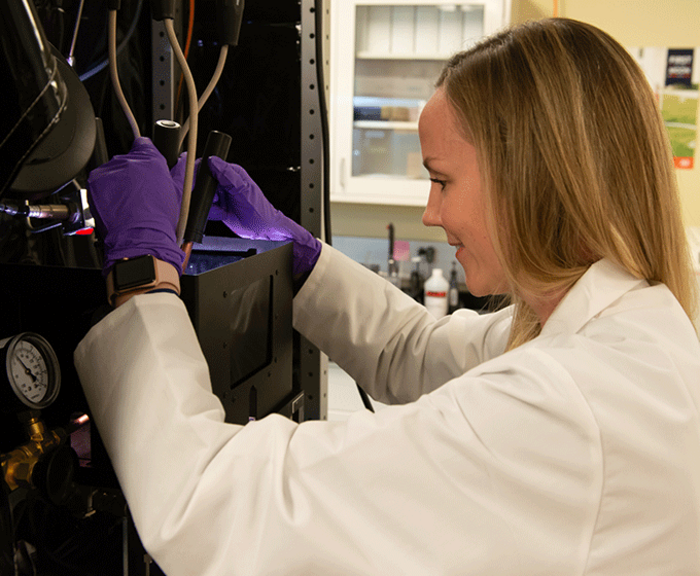Elizabeth Sooby, assistant professor in the UTSA Department of Physics and Astronomy, was selected to participate in the Department of Energy (DOE)’s Office of Science’s Early Career Research Program. This prestigious recognition, with nearly $750,000 in grant funding over the next five years, is the first of its kind to be awarded at UTSA and will support Sooby’s research on utilizing artificial intelligence (AI) to study complex melting phenomena of uranium compound while developing a technology to more efficiently discover and develop materials for high temperature applications.

Credit: The University of Texas at San Antonio
Elizabeth Sooby, assistant professor in the UTSA Department of Physics and Astronomy, was selected to participate in the Department of Energy (DOE)’s Office of Science’s Early Career Research Program. This prestigious recognition, with nearly $750,000 in grant funding over the next five years, is the first of its kind to be awarded at UTSA and will support Sooby’s research on utilizing artificial intelligence (AI) to study complex melting phenomena of uranium compound while developing a technology to more efficiently discover and develop materials for high temperature applications.
Achieving high temperature stability in materials is often a requirement to reach technological advancements in the energy sector. This is necessary in everything from steam turbine blades to oil or gas tooling to nuclear reactor materials. However, the material design and discovery process is often tedious and requires a substantial amount of time and resources to create and test novel systems.
The research will employ fundamental materials science and AI, collaborating with UTSA Computer Science professor Amanda Fernandez, to understand, predict and ultimately control the synthesis and fabrication of novel material systems and will focus specifically on uranium alloys as a test case.
The objective of Sooby’s Early Career research is to develop and test a methodology to rapidly provide high-quality, performance-indicating data during the fabrication of alloys and compounds. The data will then be leveraged to create an AI algorithm that will significantly reduce the time and cost of discovery for high temperature materials.
“It is a time-consuming process for lab assistants to manually review the images from microscopes for regions of the materials or coatings, such as graphite or epoxy,” Fernandez said. “My lab has collaborated to develop deep learning approaches to automatically label these images for Sooby and her team, coloring each of those regions on a pixel-level.”
To give a general idea, Fernandez explained that it would have previously taken four to six hours to manually label an image, whereas now their algorithm is able to perform this task in under one second. This is particularly important as Sooby’s team will be collecting high frame rate video data of the melt and solidification of actinide compounds at temperatures exceeding 1,000 °C.
“I had the idea for a project similar to this during my first year here at UTSA, inspired by the work of one of our undergraduate students,” Sooby said. “My collaborator Dr. Amanda Fernandez and I constantly looked for an opportunity to inform on the melt dynamics of high temperature materials using arc melting, video imaging and artificial intelligence.”
Sooby’s research specializes in reaction kinetics investigations by employing high temperature thermal analysis. Her laboratory is capable of synthesizing high melt point, high purity intermetallic compounds and alloys. Last year, Sooby was tapped by the DOE to develop and test fuel forms that would enhance the safety and economics of nuclear power.
On her first application to the program, Sooby was selected by the DOE’s Office of Science for the Early Career Award. “Having this project land not only provides an amazing opportunity for our students and us as faculty to investigate and develop novel techniques to study complex melt and solidification phenomena of actinide compounds, but also the high visibility and prestige of this award goes toward affirming that our team is sitting at the cutting edge of R&D in this space,” Sooby said.
Sooby is one of only 83 scientists from across the nation to receive funding for research in the DOE Office of Science’s Early Career Research Program. The program is in its 13th year and is designed to bolster the nation’s scientific workforce by providing support to exceptional researchers during their crucial early career years. Awardees were selected from a large pool of university and laboratory applicants and were peer-reviewed by outside experts.
Research like Sooby’s contributes to UTSA’s classification as a Tier One research university that is committed to tackling society’s grand challenges through world-class education and research. The university’s research advancements are often made possible with the help of talented faculty, students and institutional research partners. The university currently spends $140 million each year on research expenditures, resulting in a powerful research and development ecosystem that seeks to benefit the San Antonio community and beyond.



